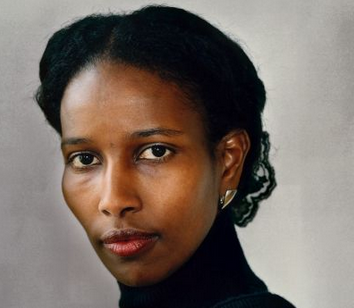On 25 June 2017, a group of LGBTQI+ rights activists of Muslim background took part in the Toronto Pride March and marched through the streets carrying posters focusing on homophobia in majority Muslim countries such as Iran. As they tried to march, a number of progressive activists (from Antifa Toronto among others) formed a circle around the group, accused them of Islamophobia and prevented them from marching. A comment from one of the Antifa members succinctly summarised the cause of their grievance: “anti-Muslim racists look at you guys and they are enboldened.” (the video can be found here)
Whilst the Toronto Police eventually intervened and allowed their march to go ahead, the incident reflects a growing trend within progressive circles to accuse Muslims (including secular, ex and atheist) of ‘Islamophobia.’
Other recent examples include the gleeful response to the news that Ayaan Hirsi Ali was cancelling her talk in Australia last April and the decision by the Southern Poverty Law Centre to designate the UK writer Maajid Nawaz – who identifies as Muslim – as an “anti-Muslim extremist.”
The Left critiques of secular and ex-Muslims usually takes two forms. The first could be described as the Useful Idiot argument. It centres on the notion that the ex-Muslims are unable to realise that their critiques of Islam validate and embolden the arguments of right wing reactionaries and racists which ultimately works against their own interests. This is the tack taken by the Antifa Toronto activist at the LGTBQI+ activists, as quoted above.
The second form (directed more commonly at figures such as Ms Hirsi Ali and Maajid Nawaz) takes the form of the ‘native informant’ argument. The native informant is a concept originally developed by Franz Fanon to refer to a “Black Subject” who “will try to appropriate and imitate the culture of the coloniser.” In contemporary use, it is a racial slur* directed at Muslims who are assumed to be selling out their ethnic community by expressing an opinion (purely for personal financial gain) which is assumed to validate the assumptions of right wing reactionaries and racists.

Maajid Nawaz (photo credit)
To understand how we have arrived at a point where anti-racist campaigners are accusing non-white intellectuals and academics of racism, we have to explore the framework through which we perceive diversity and multiculturalism to operate within society.
In any critique of the Left’s approach to race issues, it is important to note that it is well-intentioned. We can safely assume that the Left critique comes from a desire to inclusively accept different cultural practises and non-white people (as opposed to a Right critique which comes from a desire to enforce a monoculture and exclude all others). It’s also reasonable to assume that the LGBTQI+ activists of a Muslim background want a world free of racism (I assume that even Ms Hirsi Ali’s most vigorous critiques on the Left would accept that she does desire an end to racism). It can be established therefore that ‘we’ want the same outcome – the disagreements center on how we get there.
The conflict over how to reach a racism-free outcome is ultimately dependent on the framework through which one believes society is structured and that political change can be implemented. The British academic Kenan Malik has argued that the belief that a particular member of a minority can ‘betray’ their commnunity by acting as a ‘native informant’ requires an attachment to a particular political framework which can be termed ‘multiculturalism’. In this argument, it’s very important to distinguish the lived experience of multiculturalism whereby one encounters diversity and lives in a cosmopolitan society (which is obviously a good thing) from multiculturalism as a political process where policies are designed and implemented in an attempt to “institutionalise diversity.”
Conceiving of society as the sum of a range of different cultural groups living harmoniously has many advantages for the Left in that it establishes the principle that communities that constitute a minority in a particular society have an inherent right to live in the West. Furthermore, it is a useful response to the common refrain from the Right that migrants should “assimilate”.
The disadvantages however – especially for those who are ‘minorities within minorities’ – are also evident. A view of society dependent on cultural rights leads to a view of minority communities as distinct, ‘authentic’, homogeneous and bounded with interests that can be represented by a community representative or even ‘leader’. As a consequence, conflicts and diversity within a community are not noticed or are actively downplayed. Through this framework, the treatment of the Muslim LGBTQI+ activists in Toronto and Ms Hirsi Ali is justified as these individuals are – in some way – seen to be betraying their community’s interests by taking a position that is contrary to the majority.

Ayaan Hirsi Ali (photo credit)
As Malik notes, the problematic consequences of this view of multiculturalism do not result from an emphasis on diversity per se but rather from a reliance on “too rigid a notion of what diversity entails” which distorts “the right to be treated the same despite one’s differences of culture, ethnicity or faith to meaning the right to be treated differently because of them.”
So, how can a white person be a good ally not just to minority communities but to minorities within minorities? Being a good ally does not require one to believe Ms Hirsi Ali speaks for all Muslim women (has she ever claimed to?) but it does require one to acknowledge her right to speak for herself. Being a good ally does not require one to focus exclusively on homophobia in Muslim-majority countries, but it does require one to not block Muslim LGTBQI+ activists in the streets and imply they are too dumb to realise they are emboldening racists.
Indeed, rather than embolden racists, such acts may be have the opposite effect, as the acceptance of a plurality of views in minority communities can encourage the idea that one cannot judge a person’s political beliefs based on an assessment of their ethnic identity markers (just like how we do not assume two white people – say, Jeremy Corbyn and Tony Abbott – would agree on any particular issue because they have the same ethnic heritage).
Ultimately, any anti-racist campaign that seeks to cast secular or ex-Muslim activists as part of the problem is, at best, a regressive view of racial identity and, at its worst, a mirror reflection to the racial bigotry found on the far Right.
* it is worth noting there is nothing inherently racist about the idea as originally conceptualised and developed by Franz Fanon, however its contemporary use towards Muslims invariably is.


